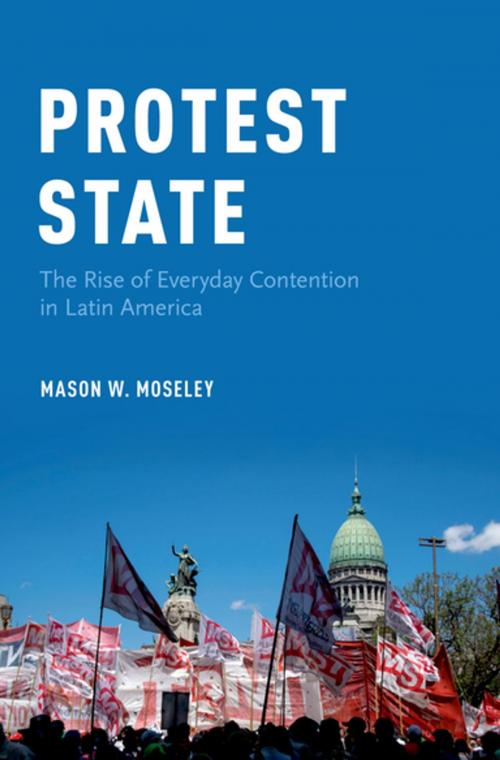Protest State
The Rise of Everyday Contention in Latin America
Nonfiction, Social & Cultural Studies, Political Science, Politics, Civil Rights, International, Social Science, Sociology| Author: | Mason W. Moseley | ISBN: | 9780190694029 |
| Publisher: | Oxford University Press | Publication: | May 1, 2018 |
| Imprint: | Oxford University Press | Language: | English |
| Author: | Mason W. Moseley |
| ISBN: | 9780190694029 |
| Publisher: | Oxford University Press |
| Publication: | May 1, 2018 |
| Imprint: | Oxford University Press |
| Language: | English |
Why is social protest a normal, almost routine form of political participation in certain Latin American democracies, but not others? In light of surging protests in countries like Argentina, Brazil, and Peru, this book answers this question through a focus on recent trends in the quality of governance and socioeconomic development in the region. Specifically, it argues that increasingly engaged citizenries -- forged by economic growth and technological advances -- coupled with dysfunctional political institutions have fueled more radical modes of participation in Latin America, as citizens' demands for government responsiveness have overwhelmed many regimes' capacity to provide it. Where weak institutions and politically engaged citizenries collide, countries can morph into "protest states," where contentious participation becomes so common as to render it a conventional characteristic of everyday political life. Drawing on cross-national surveys from Latin America and a case study of Argentina, which includes a rich dataset of protest events and dozens of interviews with political elites and citizen activists, Mason W. Moseley tests his explanation against other leading theories in the contentious politics literature. But rather than emphasizing how worsening economic conditions and mounting grievances fuel protest, this book builds the case that it is actually the improvement of economic conditions amidst low quality political institutions that lies at the root of surging contention in the region. Protest State offers a comprehensive study of one of the most intriguing puzzles in Latin American politics today: in the midst of an unprecedented era of democratic governments and economic prosperity, why are so many people protesting?
Why is social protest a normal, almost routine form of political participation in certain Latin American democracies, but not others? In light of surging protests in countries like Argentina, Brazil, and Peru, this book answers this question through a focus on recent trends in the quality of governance and socioeconomic development in the region. Specifically, it argues that increasingly engaged citizenries -- forged by economic growth and technological advances -- coupled with dysfunctional political institutions have fueled more radical modes of participation in Latin America, as citizens' demands for government responsiveness have overwhelmed many regimes' capacity to provide it. Where weak institutions and politically engaged citizenries collide, countries can morph into "protest states," where contentious participation becomes so common as to render it a conventional characteristic of everyday political life. Drawing on cross-national surveys from Latin America and a case study of Argentina, which includes a rich dataset of protest events and dozens of interviews with political elites and citizen activists, Mason W. Moseley tests his explanation against other leading theories in the contentious politics literature. But rather than emphasizing how worsening economic conditions and mounting grievances fuel protest, this book builds the case that it is actually the improvement of economic conditions amidst low quality political institutions that lies at the root of surging contention in the region. Protest State offers a comprehensive study of one of the most intriguing puzzles in Latin American politics today: in the midst of an unprecedented era of democratic governments and economic prosperity, why are so many people protesting?















